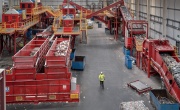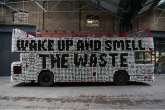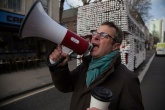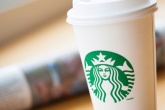Giant coffee-cup bin offers innovative recycling experiment in Manchester
Manchester is to be covered in giant coffee cup bins for the next three months to engage the public in the burning issue of paper cup waste and drive up its recycling into useful new products to benefit the local community and environment.

The first high street recycling scheme of its kind in the UK, this new social experiment involves spreading eleven giant bins in the shape of coffee cups along one of Manchester’s busiest streets, Oxford Road, over three months (12 October to December).
The bins, which have levers to open and have a aperture big enough only for a cup to go through, are designed to engage the public and collect paper cups, which will then be recycled into a resin developed by plastic recycling consultancy Nextek and design company AShortWalk that can be used to create a range of strong and durable products. The cups collected through the three-month trial will be used to create 15,000 plastic flowerpot holders, which will be used in community gardens to further ‘green the city’.
Hubbub says that if the experiment is a success, a number of local authorities have put their names forward to expand the scheme into areas across the UK.
Coffee cup waste
The issue of coffee cup waste has been one of the hottest sustainability topics this year after TV chef Hugh Fearnley-Whittingshall took to the streets of London in March for his Hugh’s War on Waste series to highlight the problem and challenge major companies to provide more sustainable solutions.
Overall, in the UK, 2.5 billion ‘paper’ coffee cups are being thrown away each year, with a tiny amount – less than one per cent – being actually recycled. This amounts to 5,000 cups being thrown away every minute.
The reason for this is that the majority of takeaway coffee cups are made with a layer of plastic film bonded to the cup’s paper shell while it is flat, with waterproofing chemical agents also added to the paper. When fully assembled, the plastic film is bonded tightly to the paper and is also trapped into the seam, making it troublesome to recycle, and requiring specialist recycling facilities to process and requiring separate collection.
On average, 272,602 disposable paper cups are used every day in Manchester. Recent research shows that 81 per cent of people in the North West say that seeing litter on the streets in their local area makes them feel angry and frustrated.
Every year, it costs Manchester City Council £7.5 million to deal with litter, fly-tipping and street cleaning, which equates to £14 per person.
“The council needs to find an alternative solution to prevent coffee cups from going to waste, and we know that the retailers have the same opinion,” says Nigel Murphy from Manchester City Council. ‘’This new partnership will bring the coffee cup agenda to the Manchester public, and will result in real change, benefiting the local community at the same time”.
Hubbub’s vision
The coffee cups collected during the £1MoreShot campaign will be blended with recycled plastic and turned into new products.
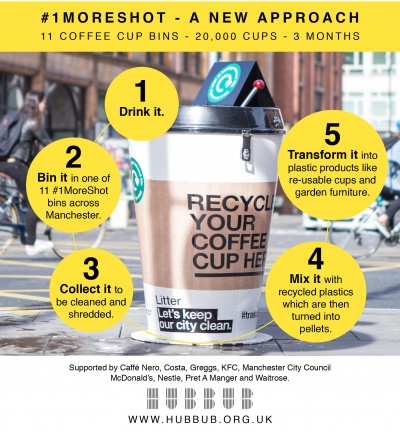
Gavin Ellis, Co-Founder of Hubbub said: “We urgently need to change the way we dispose of the 2.5 billion paper cups that are thrown away every year… this new initiative will test an innovative new technology and discover whether the public will separate out their coffee cups if specialist bins are provided.’’
The resin’s designer, Dan Dicker from AShortWalk, added: "Together with polymer experts Nextek we have spent years developing this technology, and we now hope that councils across the UK will adopt this technique as an answer to paper cup waste.
‘’Making new products from the collected cups drives demand and allows us all the see what actually happens to our cup once we place it in the bin”.
Martin Kersh, Executive Director of the Foodservice Packaging Association (FPA), which represents the manufacturers and distributors of packaging for the hospitality industry in the UK, has called the cup bins project “a very welcome development and an excellent example of collaboration from the entire paper cup supply chain working together”.
Solutions so far
Following the criticism from Fearnley-Whittingstall, it was suggested that levies similar to that on single-use carrier bags could be imposed to encourage shoppers to use reusable cups, though the government quickly confirmed it had no plans to develop such a tax.
The FPA, meanwhile said that a tax on the cups would not be the answer, claiming that establishing a system for collecting cups and recycling them is more important.
Work has also been carried out to look at more recyclable cups that could be included with mainstream cardboard collections. Starbucks agreed in July to carry out testing on a new paper cup designed by Frugalpac, which assembles the cup from recycled paper first before adding a thin plastic liner to the inside, without the use of any waterproofing chemicals.
Because the liner is only lightly glued into place, it can be separated from the paper during the recycling process at a standard paper mill, and so can be thrown into newspaper recycling bins.
However, the Recycling Association subsequently suggested that solutions to develop cups to be included with recycling should be carried out carefully to avoid contamination of the rest of the paper stream.
More information about the #1MoreShot campaign can be found on the Hubbub website. 

